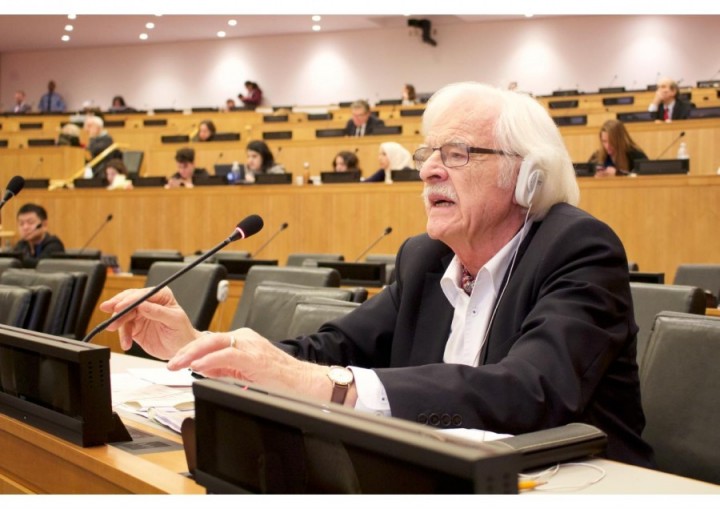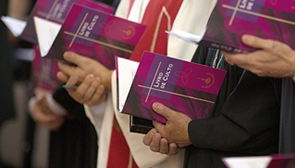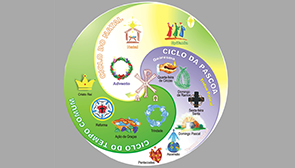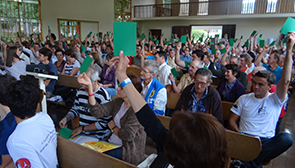
Fifth Annual Symposium on the Role of Religion and Faith-based Organizations in International Affairs: Financing for Sustainable Development, Towards an Economy of Life
Panel 1
Economy of Life: Faith-Based Perspectives on Economic Justice as a Moral Imperative – a faith-based framing for financing for development including the moral foundations for an Economy of Life and an economy that incorporates peace with justice.
Theses by Ulrich Duchrow
Thesis 1
The starting point must be the fact that, if the present economic system, the current thinking and behavior patterns, i.e. the dominant civilization as a whole, continue the life conditions of the planet will be destroyed. So it is not just a question of morality in the traditional sense but a question of life and death to overcome the dominant model of civilization. Everything we say today must reflect this extreme urgency and the faith to cope with it.
Thesis 2
The driving force of this civilization is compulsive and limitless growth – growth of production, growth of consumption, growth of resource extraction, growth of pollution, growing extinction of species, growth of climate catastrophe. But the root cause for this compulsory growth is that capital must grow. This is why this civilization is rightly called capitalist. As capital is the driving force in this civilization researchers have replaced the name Anthropocene by Capitalocene for our geological epoch.
Historically this civilization started in the 8th century BCE, reinforced again with the introduction of coins around 600 BCE, when in the whole of Eurasia money entered daily life in the context of professionalizing war through mercenaries, one of the first examples of waged labor. Changing from community forms of economy to individualized markets led to insecurity and the assumption that only as much money as possible can secure the means of life. This greed was institutionalized by charging interest on loans. So from the beginning we have an interaction of structures, behaviors and thinking. Societies were split into rich and poor, particularly through debt mechanisms; individuals started with calculating thinking; empires linked the expansionism of money with the violence of conquest. The Roman Empire was the first climax of this civilization.
Historically this civilization started in the 8th century BCE, reinforced again with the introduction of coins around 600 BCE, when in the whole of Eurasia money entered daily life in the context of professionalizing war through mercenaries, one of the first examples of waged labor. Changing from community forms of economy to individualized markets led to insecurity and the assumption that only as much money as possible can secure the means of life. This greed was institutionalized by charging interest on loans. So from the beginning we have an interaction of structures, behaviors and thinking. Societies were split into rich and poor, particularly through debt mechanisms; individuals started with calculating thinking; empires linked the expansionism of money with the violence of conquest. The Roman Empire was the first climax of this civilization.
Thesis 3
The next step of this civilization happened in the 11th century CE in the upper Italian trading and banking city states. They did not only accumulate money by collecting treasures but mechanized the profit making by immediately reinvesting the profits of trade and usury in order to make higher profits. This transformed money as a useful instrument into capital producing capital, which is the reason why this period is called early capitalism. The next stage came with pushing capital accumulation into the process of production. This is called industrial capitalism. Meanwhile we have reached the stage of financial capitalism, by creating even higher profits through speculation and pushing the real economy to increase the profit rate by maximum growth at the cost of people and the earth.
Thesis 4
What is the role of faith communities in this situation? The basis of the response lies in the ancient scriptures. From China to Greece via India, Persia and Ancient Israel all religions and philosophies, in all cultural diversity but with a common thrust, responded to the emerging civilization driven by greedy money, greedy individuals and empires. The prophets, from Amos on, called for justice, later put into social laws of the Torah; the Buddha identified the poisons creating suffering as greed, violent behavior and illusion; Laotse, the founder of Daoism, tried to overcome violent and possessive male behavior by using the symbol of water to promote humble, soft, nurturing and sustainable ways of life; Confucius worked at restoring social relationships; Socrates, Plato and Aristotle developed ethical and political rules to overcome what Aristotle called chremastics, an economy responding to greed, not to needs and, therefore, geared to accumulating limitless money. This period is called the Axial Age. Later, within the Roman Empire, the first climax of the money-driven civilization, Jesus called for a basic faith decision between the God of justice and the accumulation idol Mammon. The Prophet Muhammad, building on the Hebrew and the Christian Bible, confronted the rich traders in Mecca in his faith-based struggle for justice. So we have an intercultural and inter-religious pool of wisdom and spiritual power to overcome the dominating, death-bound civilization, driven by capital accumulation.
Thesis 5
Within the Christian ecumenical movement of the recent past we drew water from this well, particularly starting with the Conciliar Process for Justice, Peace and the Integrity of Creation (JPIC) at the 6th WCC Assembly in Vancouver in 1983. In the course of this process, all Christian communities, in official decisions at international level, formally rejected imperial capitalism and started to work for alternatives:
· In 2003 the LWF in Winnipeg, calling the ideology behind the Washington Consensus idolatry;
· In 2004 what was then called the World Alliance of Reformed Churches, WARC, in Accra, rejecting imperial capitalism in the form of a confession, drawn up in the form of the Barmen Theological Declaration – the basis of the Confessing Church against National Socialism;
· In 2013 the WCC in Busan Assembly in various documents. The (adopted) Bogor Statement promises to “build a prophetic movement for an Economy of Life for all”; the Mission Declaration says: “Mission spirituality resists and seeks to transform all life-destroying values and systems”; the São Paulo Statement on “International Financial Transformation for the Economy of Life” declares:
“We reject an economy of over-consumption and greed, recognising how neoliberal capitalism conditions us psychologically to desire more and more, and affirm instead Christian and Buddhist concepts of an economy of sufficiency that promotes restraint”.
“We reject an economy of over-consumption and greed, recognising how neoliberal capitalism conditions us psychologically to desire more and more, and affirm instead Christian and Buddhist concepts of an economy of sufficiency that promotes restraint”.
· Two weeks after Busan Pope Francis issued his Apostolic Letter “Evangelii Gaudium” summarizing the 30 years of ecumenical work in the famous words:
“Just as the commandment 'Thou shalt not kill' sets a clear limit in order to safeguard the value of human life, today we also have to say 'thou shalt not' to an economy of exclusion and inequality. Such an economy kills....
No to the new idolatry of money...
No to a financial system which rules rather than serves...
No to the inequality which spawns violence...
No to selfishness and spiritual sloth...”
“Just as the commandment 'Thou shalt not kill' sets a clear limit in order to safeguard the value of human life, today we also have to say 'thou shalt not' to an economy of exclusion and inequality. Such an economy kills....
No to the new idolatry of money...
No to a financial system which rules rather than serves...
No to the inequality which spawns violence...
No to selfishness and spiritual sloth...”
It is a unique event in church history that – after 500 years of division – all Christian churches have rejected imperial capitalism and its thinking patterns and embarked on the search for alternatives.
Thesis 6
However, we have no reason to feel triumphalist about the ecclesial state of affairs. Not only have very few member churches implemented this systemic critique and transformation-oriented work, there are growing numbers of faith communities, calling themselves Christian, but following the prosperity gospel, a complete assimilation to capitalism – think of the election behavior of these groups in this country or Brazil. This means that while revitalizing the Axial Age religions and philosophies we have to also engage in the critique of religion.
Thesis 7
The way out is alliance building with all transformation forces: e.g. the groups of Jewish and Muslim liberation theology and action, the International Network of engaged Buddhists, but also, and foremost, with the struggling victims of the dominating systems organized in social, environmental and peace movements. The ecumenical organizations WCC, LWF, WCRC and CWM, gathering in São Paulo already in 2012, started a process for NIFEA, a New International Financial and Economic Architecture. They developed an action plan and already underlined the necessity to cooperate with social movements. Pope Francis together with Cardinal Turkson, then President of the Pontifical Council for Justice and Peace that was merged with the newly formed Dicastery for Promoting Integral Human Development, even organized annual meetings with social movements fighting together the idolatry of Mammon and the fetishism of commodities, money and capital.[1] I strongly recommend that the (Protestant/Orthodox/Anglican/Episcopal) ecumenical organizations under the leadership of the WCC approach the Pope in order to promote an alliance-building if not a merger of both the NIFEA process and the Vatican meetings and cooperation with the social movements. This would enable local congregations and base groups as well as regional and national ecumenical networks to work again within a global ecumenical framework for systemic critique and transformative action.
Thesis 8
This could be the ideal global-local Christian counterpart to the UN process of the Sustainable Development Goals (SDGs) in cooperation with International Partnership on Religion and Sustainable Development (PaRD). However, it would be a critical partnership. Because – as the last report of the Club of Rome showed[2] – the SDGs are full of contradictions. The main contradiction exists between goal 8 (economic growth) and the ecological goals (12-15). Goal 8 is built on the illusion of green capitalism assuming that destruction of creation and growth can be decoupled. And how, without challenging the capitalist order, can the following happen? “By 2030, ensure that all men and women, in particular the poor and the vulnerable, have equal rights to economic resources, as well as access to basic services, ownership and control over land and other forms of property, inheritance natural resources, appropriate new technology and financial services, including microfinance“ (goal 1.target 4)? Faith based organizations should – on the basis of their decisions – challenge the UN to realize that without a deep systemic critique and transformation the SDGs will remain wishful thinking.
Thesis 9
What are some of the crucial issues? There are three structural pillars on which capitalism is built: the property order, the money order and wage labor. The absoluteness of private property has to be overcome by a property order from below (meaning not just state property) based on the commons and geared at the common good.[3] Money has to be liberated from being a commodity for the sake of accumulation and turned into a public good to fulfill necessary functions for the real economy as e. g. exchange, buying and credit.[4] We do not need only more money for development, but a new post-capitalist finance order (starting with a strong regulation, SDG 10.5). Especially the banks have to be stopped being able to create money on the basis of credits linked to interest, because with this already the money itself contains the drive to grow. This new financial order would also include the closure of tax havens (technically possible through taxing at the world's central clearing institutions). This would help in implementing SDG 17.1, rightly calling for the improvement of “the domestic capacity for tax and other revenue collection”. Finally labor must be re-linked to the means of production, e.g. in the form of cooperatives or workers' participation. And greater appreciation has to be shown for the work of carers.[5]
Thesis 10
Besides these structural issues there is a need to re-direct thinking, feeling and attitudes. When money started to stimulate calculating thinking (“what’s in it for me?”), competition and loss of solidarity religions and philosophies responded with engagement for justice, community and solidarity (agape). This indicates two things: 1. The civilization driven by limitless accumulation of money is nearly 3000 years old. It is impossible to change it, and the attitudes determined by it, over night. Overcoming it must be the long-range perspective, but there must also be short-range and middle-range intermediate steps and strategies to achieve it. E.g.: to develop a new property order we can start with basic goods and services like water, energy, transport, education, health. They must be public but are under constant attack by those who want to privatize them, i.e. make profits with them. Faith-Based Organizations should strictly campaign to fight privatization in the field of SDGs 1-4 and 6-7. Here there should be even no Public-Private-Partnerships. Meanwhile many people have negative experience with privatized services and can be mobilized for public services, financed by an improved tax system and controlled democratically because people are directly affected. Another key area of financing for development is stopping subsidies for capital-intensive agribusiness and, instead, supporting small-scale organic food producers (SDG 2 b).
2. Faith communities can revitalize the message of their original sources, promoting the common good, justice and solidarity – not just by words but by practice. They have community structures to renew and they can strengthen people's movements struggling for the economy for life, justice and peace.
2. Faith communities can revitalize the message of their original sources, promoting the common good, justice and solidarity – not just by words but by practice. They have community structures to renew and they can strengthen people's movements struggling for the economy for life, justice and peace.
In closing, I repeat what I said at the beginning: All this is happening while reality is already catching up – the “self-burning of humanity”, the dying of species, the destruction of social cohesion, the dismantling of democracy, the resulting (civil) wars and forced migration to name but a few systemic consequences.
For the churches, this is a Kairos moment like National Socialism in Germany and Apartheid in South Africa were. The integrity of the church is at stake when the dominant system is driving the earth into the abyss. No ambiguity is allowed any more, to quote the international ecumenical decisions. When has it ever been more urgent for faith communities at all levels to resist and stand up for a new culture of life, united with those people who are primarily affected – “the lowest of the low“ (Mt 25:40) and their organizations?
[2] WEIZSÄCKER, Ernst Ulrich von/Wijkman, Anders: Come On! Capitalism, Short-termism, Population and the Destruction of the Planet. Berlin: Springer, 2018.
[3] Cf. DUCHROW, Ulrich / Hinkelammert, Franz J.: Property for People, Not for Profit: Alternatives to the Global Tyranny of Capital. London and Geneva: Zed Books in association with the Catholic Institute for International Relations and the World Council of Churches, 2004.
[4] Cf. DUCHROW, Ulrich/Hinkelammert, Franz: Transcending Greedy Money: Interreligious Solidarity for Just Relations. New York: Palgrave MacMillan, 2012.
[5] Cf. RIEGER, Jörg/Henkel-Rieger, Rosemarie: Unified We Are a Force. How Faith and Labor Can Overcome America's Inequalities. St. Louis: Chalice Press, 2016.




















